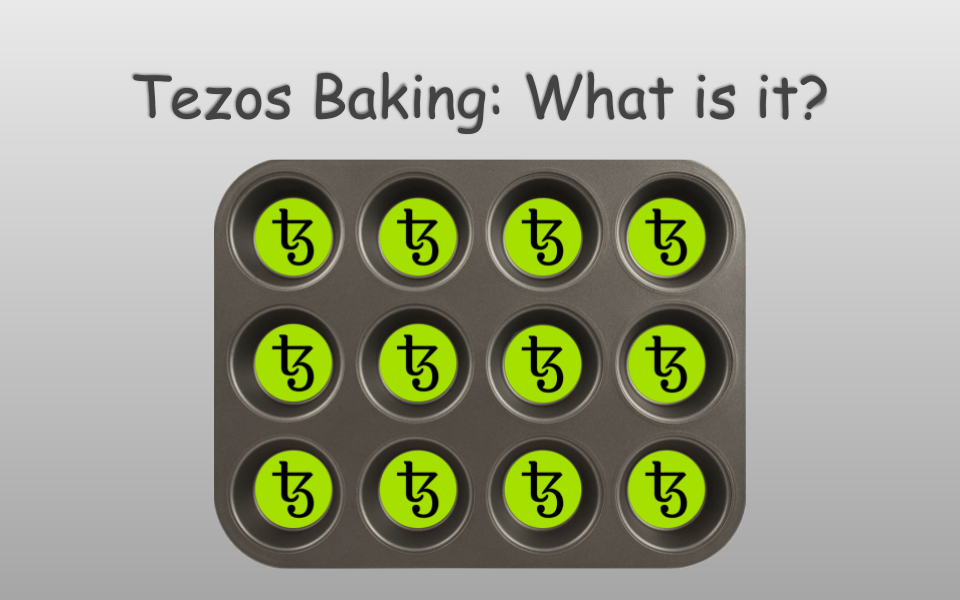
Staking Tezos
Tezos has recently been regaining the spotlight in the cryptocurrency community after it doubled in price earlier this year from around $0.40 to a local high of $1.08. There is a lot of optimism surrounding tezos as developments and on chain governance moves forward without issues that it experienced following its record breaking $232M ICO. 
One area that has received a lot of attention is Tezos “Baking”. Baking is essentially a different word for Staking in a proof of stake system. However, it’s done a little differently so it has a different name. Baking rewards are currently around 5-7% APR depending on how they are done, so there is a lot of benefit to baking your tezos.
So let’s look into Baking a little more:
Tezos Baking
- Tezos (XTZ) is a variation of the proof of stake consensus algorithm called Delegated Proof of Stake.
- Staking is called “baking” in the Tezos protocol.
- Baking is signing, and appending a block of transactions.
- Tezos Baking is the process where participants stake their Tezos (XTZ) tokens to run a node in the Tezos blockchain to get rewards.
- Like staking, your coins or tokens cannot be withdrawn until your turn or time comes to bake or endorse.
- Blocks are baked every minute(60sec) and the reward for successfully baking a block is 16 XTZ plus the fees collected from transactions.
Quick look at DPOS
DPOS: Delegated proof if stake is a high performance consensus protocol developed by Dan Larimer originally implemented in Bitshares. DPOS has proven to be a very successful high performance consensus mechanism backing BTS, STEEM, and EOS 3 of the highest transaction activity blockchains in existence today. A quick explanation of DPOS is that instead of everyone staking, a certain number of elected delegates are selected to produce blocks and earn staking rewards. In order to do this, delegates in BTS, STEEM, and EOS must compete for the top 20 spots in order to receive that ability. Tezos has taken this idea and changed it a little, allowing more than 20 delegates to become “bakers” or block producers and earn rewards. If you want to learn more about the different types of proof of stake follow the link.
Baking Account: Implicit accounts
- Only accounts that are allowed to bake in Tezos.
- Account has to be registered as a delegate.
- Bakes its own account balance.
- Can bake originated accounts’ balance delegated to it.
Normal Account: Originated accounts
- Accounts that cannot bake.
- Have to assign a delegate with an implicit account in order to bake.
- Specifies delegate keys using their manager keys. (Chooses a delegate to represent it.)
- Delegate then, participates in Tezos’ consensus algorithm.
- Can re-assign delegates after a few cycles, which is every 4,096 blocks.
Minimum Staking Requirement: Roll
- 10,000 XTZ is called a roll.
- Can be owned by a baker or can be multiple originated accounts delegated to it
- The more rolls (XTZ) a baker has, the higher the chances of being picked to bake or endorse a block.
Verifying or Endorsing
- Endorsers delegates chosen to verify if a block was baked correctly.
- Endorsers receive XTZ rewards for verifying a block.
- 32 endorsers/delegates are needed to endorse a block.
The Snapshot
A snapshot is taken every 256 blocks (1 block per minute / 256 minutes / a little over 4 hours). It contains the number of rolls owned by each delegate. Tezos indicated that if snapshots are taken too often will need large amount of memory. On the other hand, if the intervals are too far apart, it can easily be manipulated or gamed by bakers. Where, a baker can buy enormous amounts of XTZ just pre a snapshot is taken, to increase its chances of getting picked to bake/endorse the next block/s.
Security Deposits
- 512 XTZ security deposit is required to bake a block.
- 64 XTZ security deposit is required to endorse a block.
- Moved to another account for a number of cycles (preserved cycles).
- When cycles are done, deposits and rewards are moved back to the delegate’s account.
Active & Passive Delegates
Passive Delegates are not eligible to bake or endorse. Active Delegates can. If an Active Delegate fails to bake for the last 5 cycles or had no changes on its security deposit account funds, it’s at risk in becoming a Passive Delegate. Being classed as passive can however be avoided. Just make small transactions with your security deposit account once every two cycles.
How can I earn Baking Rewards?
There are different ways you can earn baking rewards. Recently staking services such as Coinbase venture capital backed Staked.us have popped up to provide a quality staking service for this protocol. Currently not many standard POS staking services offer baking, as its different and harder to implement than traditional POS. There are also some exchange getting involved such as Gate.io who have been baking and rewarding users deposits for many months already.
Conclusion
Baking has already proven to be an interesting twist on the proof of stake consensus mechanism and shows promise for becoming a useful consensus mechanism of the future. While tezos is still young, it is growing in users and use cases every day. And, with the huge amount of capital tezos has from the massive crowdsale, Tezos has the potential to become a big player in the cryptocurrency smart contract space. More information on the Tezos baking process can be found within the Tezos documentation.





































